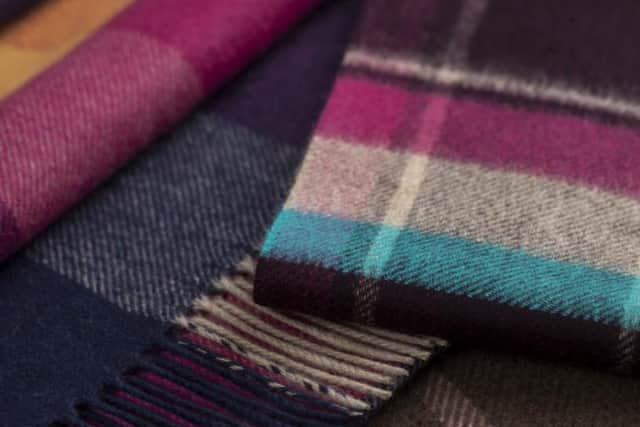How a stitch in time could help save the planet - Ross Powell comment
No longer is it “fashionable” to be adding to one of the world’s biggest contributors to the climate crisis, and more and more of us are changing our ways.
Over-production of synthetic fibres must be addressed. These are materials that are derived from fossil fuels, that are non-biodegradable and that release hundreds of thousands of micro-plastics into our water systems every time they are washed. Instead, we need to embrace garments made from natural fibres such as cashmere and wool, items that can last possibly a lifetime if shown the love they deserve.
Advertisement
Hide AdAdvertisement
Hide AdFast fashion has accelerated the problem. Brands source low-cost and lower-quality products from sweatshop factories and market them to consumers at rock-bottom prices. Many of those consumers will be lucky if their new items last more than a few months. It’s not long before they’ve lost their shape, or become threadbare and discarded.


This is madness and it has to stop. We need to change consumer and industry attitudes towards our buying habits and the mass over-production and promotion of clothing.
The most sustainable garment is the one we already own and more of us are freshening up our wardrobe by giving our clothes a second chance.
If they show wear and tear as a result of ageing or damage, they can be repaired, and the response we’ve had from customers who have brought battered but cherished cashmere items to us at Cashmere Circle shows that consumers really do appreciate seeing quality products made to look like new.


What we’re trying to achieve with repair is the recreation of the “buyer’s high” that comes with purchasing a new item. Customers who think their moth-eaten cashmere jumper is beyond salvation are amazed when they see what can be done by our team of artisans when pieces return looking like they’ve just come off the shelf.
Second to caring for the clothes we own is buying secondhand. There is a new generation of consumers who realise they can buy quality items at a fraction of the price that have a substantially smaller impact on the planet. I recently bought a £200 pair of Harris Tweed trousers for £5 from a charity shop. After £15 worth of tailoring from the seamster around the corner they look terrific. It also supports your local tailoring businesses.
Solution
Let’s face it, many clothes rarely see daylight. About half are put in the wardrobe and stay there. It’s crazy. But again there’s a solution to this problem through clothing rental sites offering anything from dinner jackets to casual trousers.
It’s clear that there is an appetite for truly sustainable fashion and the growth of solutions is catering to this.
Advertisement
Hide AdAdvertisement
Hide AdHowever, the shift online, at the same time as prices have fallen, has only helped to drive unsustainable consumption.
Targeted social media ads take us directly to items we don’t need, and pages and pages of similar items the brands very kindly “think you’ll also like”. It makes the whole process of shopping too easy and means more items become impulse/boredom purchases.
But this is how it is designed and it is important not to put the blame on the consumer for contributing to the waste and throw-away culture. The brands and big retailers are driving us to buy more.
In recent years, some brands have gone from having two collections a year – summer and winter – to as many as 16. That rate of renewal may increase turnover, but it increases unnecessary purchasing, adds to the stockpile of products and, ultimately, leads to more waste.
There has been a wave of “sustainable” fashion options over the past few years, but most are still driven by this damaging consumption model. A model that has no place for repair, because repair means we’d buy less.
Impact
But we need to be repairing, because even if the garment we buy is marketed as "sustainable”, there is still a significant environmental impact. For example, buying a new cashmere jumper rather than repairing an existing one results in the same carbon emissions as a return flight from London to Dubai.
And this is where the damage is being done and where leadership is required. We need brands to take responsibility for their garments after they’ve left their shop by promoting and offering care options as this is where we will see the biggest change: enter Johnston’s of Elgin.
We have just launched a repair and recycle partnership with Johnstons of Elgin, the UK’s oldest and largest producer of luxury cashmere and fine woollens. Recognising the importance of repair as part of an industry leading sustainability agenda, Johnston’s is promoting Cashmere Circle’s care and repair services to help its customers get the most out of their garments.
Advertisement
Hide AdAdvertisement
Hide AdFurther to this, they are closing the loop with a recycling programme that will reward customers with a voucher to use in store, as well as a tree planted for every garment donated to Cashmere Circle’s Fashion for Forests recycling project.
This is the sort of leadership required to address the damaging overconsumption of the fashion industry and serves as the perfect example as we look to expand our repair offering and grow Cashmere Circle’s network of partner knitwear brands.
My message to the retailers, manufacturers and consumers is simple: it’s time to mend our ways.
Ross Powell, co-founder of Cashmere Circle, a sustainable Scottish textiles company delivering a luxury repair, revive and recycling service for knitwear.
A message from the Editor:
Thank you for reading this article. We're more reliant on your support than ever as the shift in consumer habits brought about by coronavirus impacts our advertisers.
If you haven't already, please consider supporting our trusted, fact-checked journalism by taking out a digital subscription.
Comments
Want to join the conversation? Please or to comment on this article.
